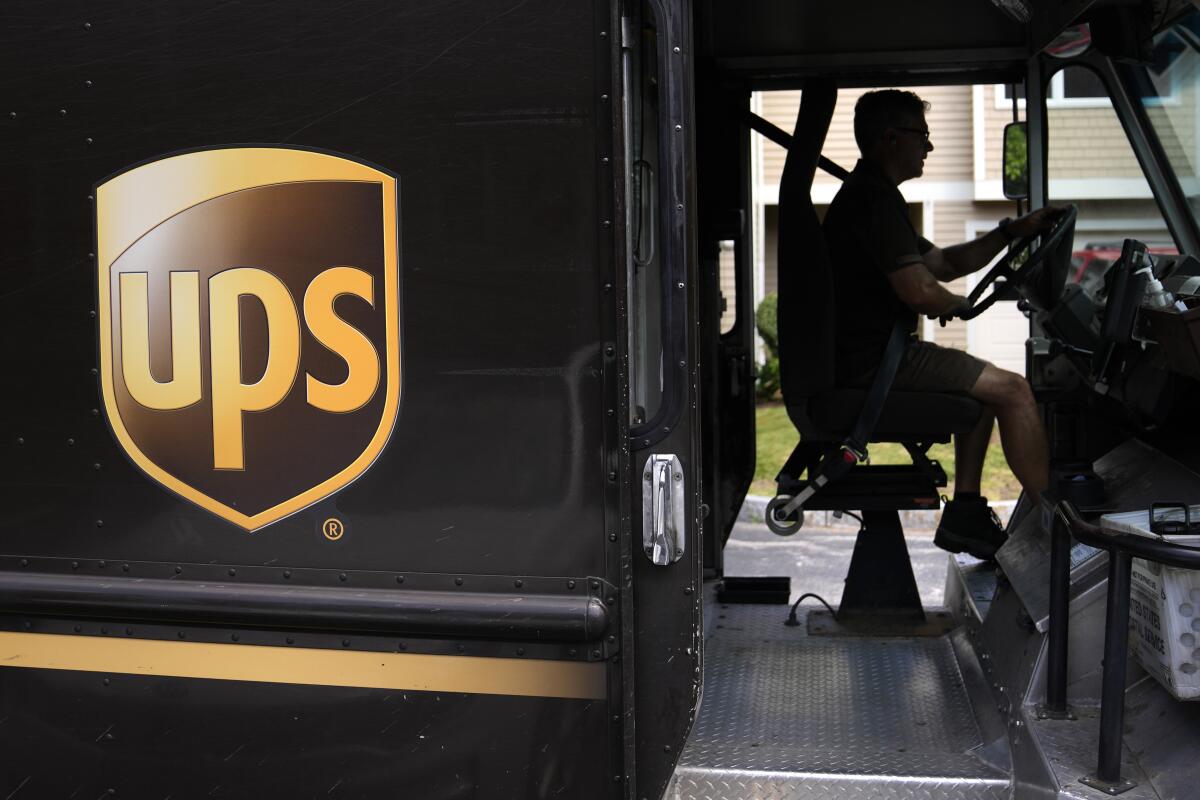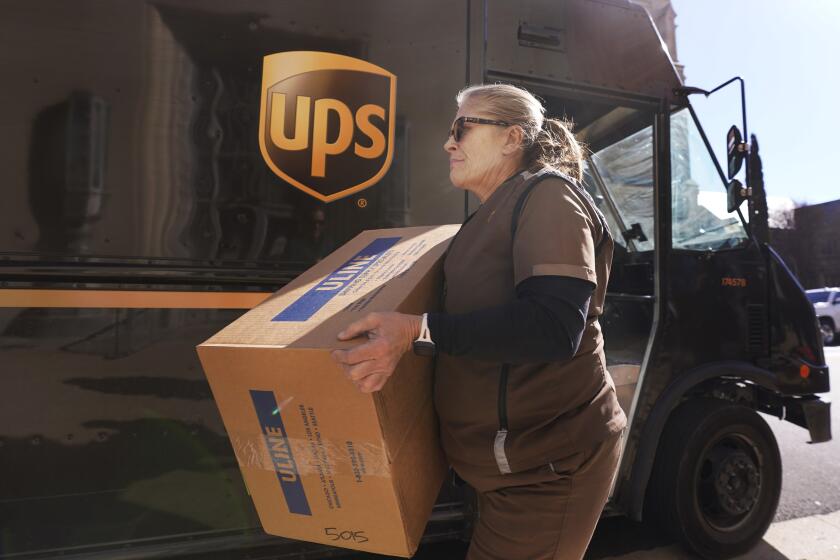UPS workers OK 5-year contract, capping contentious talks that threatened deliveries

- Share via
The union representing 340,000 UPS workers said Tuesday that its members voted to approve the tentative contract agreement reached last month, putting a final seal on contentious labor negotiations that threatened to disrupt package deliveries for millions of businesses and households nationwide.
The Teamsters said in a statement that 86% of the votes cast were in favor of ratifying the contract. They also said it was passed by the highest vote for a contract in the history of the Teamsters at UPS.
The union also said more than 40 supplemental agreements were also ratified, except for one that covers roughly 170 members in Florida. The national master agreement will go into effect as soon as that supplement is renegotiated and ratified, it said.
“Our members just ratified the most lucrative agreement the Teamsters have ever negotiated at UPS,” Teamsters General President Sean M. O’Brien said in a statement. “This contract will improve the lives of hundreds of thousands of workers.”
He said the contract set a new standard for pay and benefits.
UPS reaches tentative contract with 340,000 unionized workers, potentially dodging calamitous strike
UPS reached a tentative contract agreement with its 340,000-member union, averting a strike that had the potential to disrupt business nationwide.
“This is the template for how workers should be paid and protected nationwide, and nonunion companies like Amazon better pay attention,” he said, giving a nod to the union’s growing ambitions to take on the online commerce behemoth.
Voting on the new five-year contract began Aug. 3 and concluded Tuesday.
After negotiations broke down in early July, Atlanta-based UPS reached a tentative contract agreement with the Teamsters just days before an Aug. 1 deadline.
The company had said it expected bargaining to restart if members rejected the deal, but that could have also opened the door to a strike.
Under the tentative agreement, full- and part-time union workers will get $2.75 more per hour in 2023, and $7.50 more in total by the end of the five-year contract. Starting hourly pay for part-time employees also got bumped up to $21, but some workers said that fell short of their expectations.
UPS management plainly knew what was at stake in a strike threat, and worked to reach a deal. What’s holding back the Hollywood bosses?
UPS says that by the end of the new contract, the average UPS full-time driver will make about $170,000 annually in pay and benefits. It’s not clear how much of that figure is pay versus benefits.
As part of the deal, the delivery company also agreed to make Martin Luther King Jr. Day a full holiday, end forced overtime on drivers’ days off and stop using driver-facing cameras in cabs, among a host of other issues. It eliminated a two-tier wage system for drivers and reached tentative deals on safety issues, including equipping more trucks with air conditioning.
Union members, angered by a contract they say union leadership forced on them five years ago, argued that they have shouldered the burden as the pandemic increased delivery demand and UPS saw 140% profit growth. Unionized workers said they wanted to fix what they saw as a bad contract.
The Teamsters’ leadership was upended two years ago with the election of O’Brien, a vocal critic of union President James Hoffa — son of the famed Teamsters firebrand — who signed off on the previous contract.
The 24 million packages UPS ships daily amount to about a quarter of all U.S. parcel volume, according to the global shipping and logistics firm Pitney Bowes. UPS says that’s equivalent to about 6% of the nation’s gross domestic product.
More than 300,000 United Parcel Service workers are closer to striking after the company failed to reach an agreement with the International Brotherhood of Teamsters.
This isn’t the first showdown the union has had with the delivery company. During the last breakdown in labor talks a quarter of a century ago, 185,000 UPS workers walked out for 15 days, crippling the company’s ability to function.
A walkout this time would have had much further-reaching implications, with millions of Americans now accustomed to online shopping and speedy delivery. The consulting firm Anderson Economic Group estimated a 10-day UPS strike could have cost the U.S. economy more than $7 billion and triggered “significant and lasting harm” to the business and workers.
When the union and UPS were at a stalemate in July, large and small businesses worked to create contingency plans in the event of a strike.
Labor experts say they see the showdown as a demonstration of labor power at a time of low U.S. union membership. This summer, Hollywood actors and screenwriters have been picketing over pay issues. The United Auto Workers union is considering a potential strike.
“Together we reached a win-win-win agreement on the issues that are important to Teamsters leadership, our employees and to UPS and our customers,” UPS Chief Executive Carol Tomé said when the tentative deal was announced.
Industry groups, the U.S. Chamber of Commerce, labor leaders and President Biden also applauded the deal.
More to Read
Inside the business of entertainment
The Wide Shot brings you news, analysis and insights on everything from streaming wars to production — and what it all means for the future.
You may occasionally receive promotional content from the Los Angeles Times.













